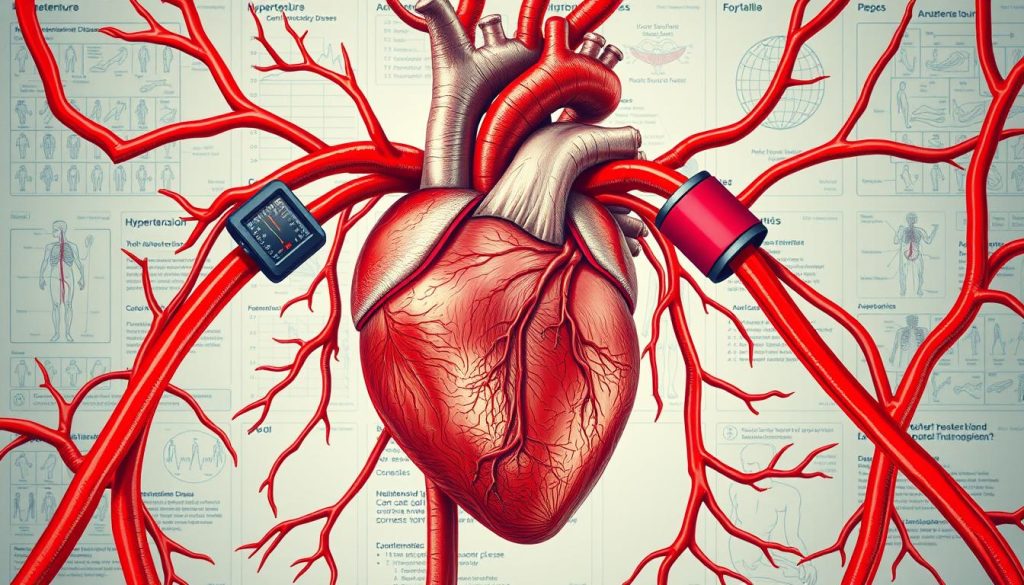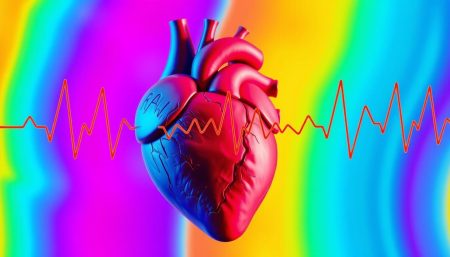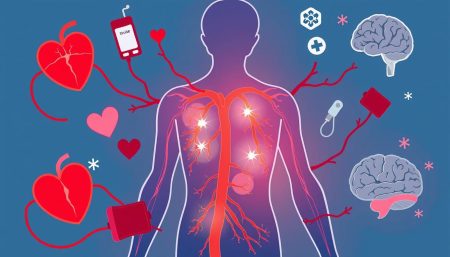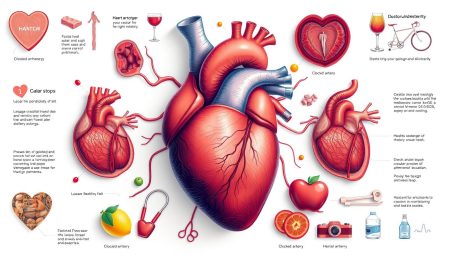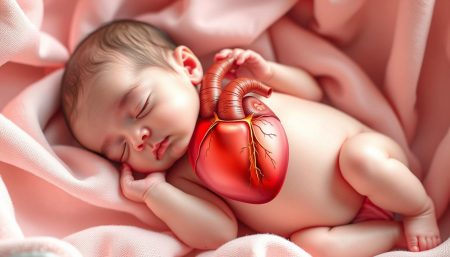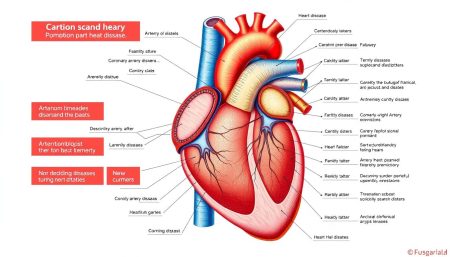High blood pressure, or hypertension, is a silent threat to heart health. Many wonder about its connection to cardiovascular disease. This guide explores hypertension causes and their impact on heart function.
Cardiovascular risk factors often include elevated blood pressure. Understanding these risks is key for managing blood pressure. We’ll look at the link between hypertension and heart disease, with insights from medical experts.
This detailed look at hypertension will cover detection, treatment, and prevention strategies. By the end, you’ll understand how hypertension affects your heart. You’ll also know steps to protect your heart health.
Understanding the Relationship Between Hypertension and Cardiovascular Disease
Hypertension is a big player in preventing heart disease. It’s important to see how high blood pressure affects our heart health.
The Role of Blood Pressure in Heart Health
Keeping blood pressure in check is vital for a healthy heart. High blood pressure strains the heart and blood vessels. This strain can damage them over time, raising the risk of heart issues.
How Hypertension Affects the Cardiovascular System
Hypertension can make blood vessel walls thicken and harden, known as atherosclerosis. This makes blood flow harder, raising the risk of heart attacks and strokes. Managing blood pressure well is key to lowering these risks.
Key Definitions and Medical Classifications
It’s important to know the medical terms related to hypertension and heart health. Here’s a quick guide to the main classifications:
| Blood Pressure Category | Systolic (mm Hg) | Diastolic (mm Hg) |
|---|---|---|
| Normal | Less than 120 | Less than 80 |
| Elevated | 120-129 | Less than 80 |
| Stage 1 Hypertension | 130-139 | 80-89 |
| Stage 2 Hypertension | 140 or higher | 90 or higher |
Knowing these classifications helps people manage their blood pressure better. This can lower their risk of heart disease.
Is Hypertension a Cardiovascular Disease: Defining the Connection
Hypertension, or high blood pressure, is vital for heart health. It’s not a cardiovascular disease itself but a big risk for heart issues. Knowing this link is key to preventing heart disease.
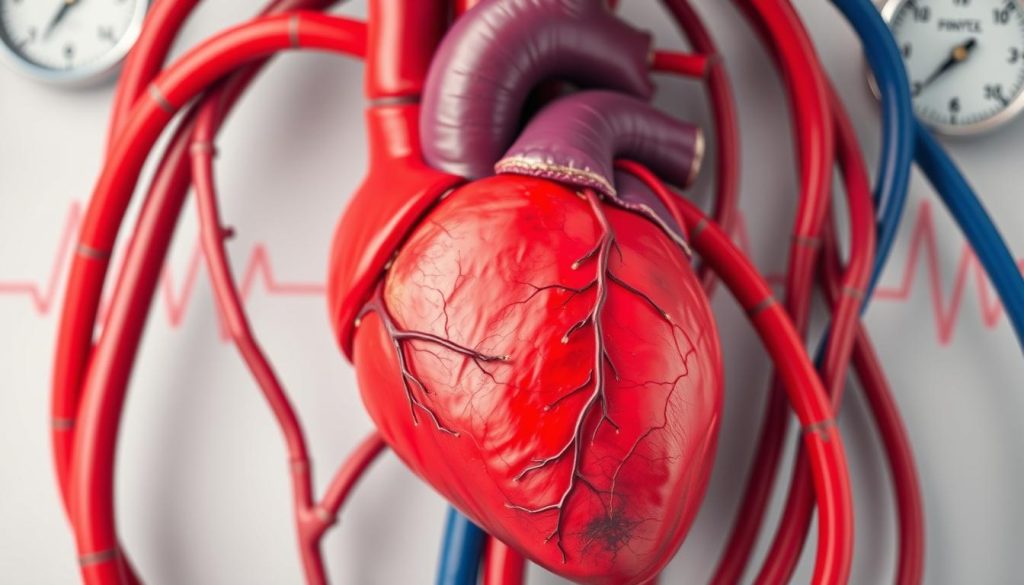
Blood pressure shows how hard blood pushes against artery walls. High pressure over time can harm blood vessels and organs, like the heart. This harm can lead to many cardiovascular diseases.
Doctors see hypertension as a major risk for heart disease. It’s called the “silent killer” because it has no symptoms but can cause serious health problems if not treated.
“Hypertension is like a constant strain on your cardiovascular system, slowly but surely increasing your risk of heart disease.”
Here’s how hypertension affects the heart:
- Causes artery stiffness
- Makes the heart work harder
- Helps plaque build up in arteries
- Increases the risk of heart attack and stroke
It’s important to catch and manage hypertension early to prevent heart disease. Regular blood pressure checks, lifestyle changes, and medication can lower your risk of heart problems.
| Blood Pressure Category | Systolic (mm Hg) | Diastolic (mm Hg) | Risk Level |
|---|---|---|---|
| Normal | Less than 120 | Less than 80 | Low |
| Elevated | 120-129 | Less than 80 | Moderate |
| Hypertension Stage 1 | 130-139 | 80-89 | High |
| Hypertension Stage 2 | 140 or higher | 90 or higher | Very High |
Primary Risk Factors for Developing Hypertension
It’s important to know what causes high blood pressure. Many things can lead to it, from your genes to your lifestyle.
Genetic and Family History Factors
Your genes have a big part in your blood pressure. If your family has high blood pressure, you might too. Some genes affect how your body handles salt and blood pressure.
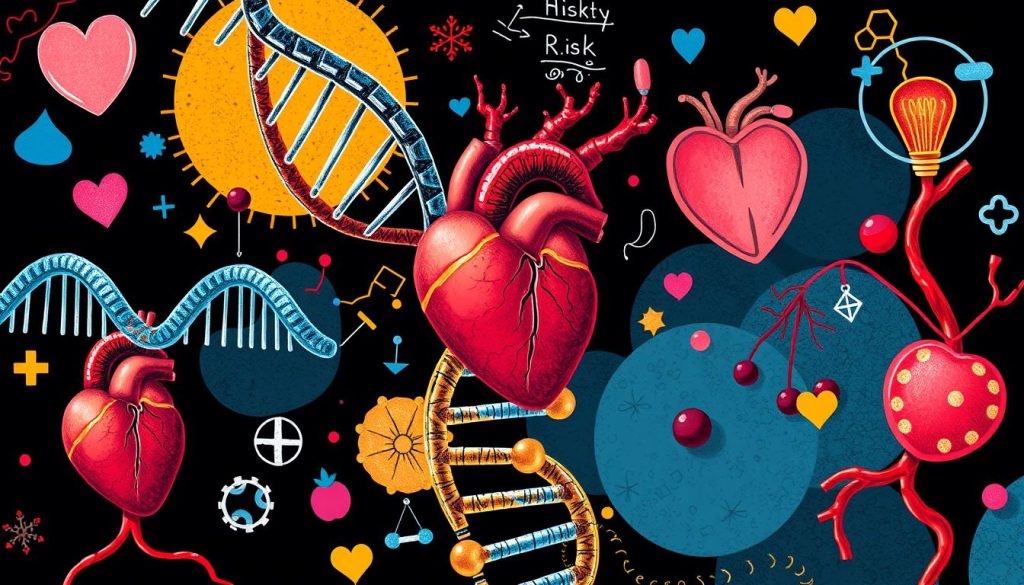
Lifestyle and Environmental Contributors
What you do every day affects your blood pressure. Eating too much salt and not enough potassium can be bad. Not moving enough, drinking too much alcohol, and smoking also raise your risk.
Stress and not sleeping well can also make your blood pressure go up.
Age and Gender-Related Risk Factors
As we get older, our blood vessels get less flexible. This makes high blood pressure more likely. Men are at higher risk until they’re 64. Then, women’s risk goes up after menopause.
This shows why it’s key to check your blood pressure often, no matter your age or gender.
| Risk Factor | Impact on Blood Pressure | Modifiable? |
|---|---|---|
| Genetics | High | No |
| Diet | Moderate to High | Yes |
| Physical Activity | Moderate | Yes |
| Age | High | No |
| Stress | Moderate | Yes |
Knowing these risk factors helps you take steps to control your blood pressure. This can lower your chance of serious problems.
The Impact of High Blood Pressure on Heart Health
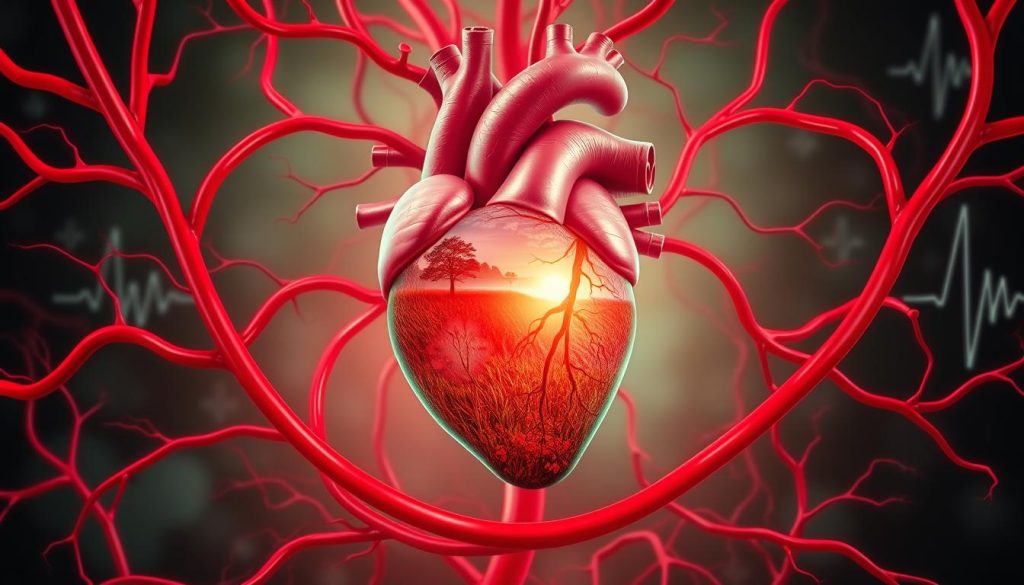
High blood pressure quietly harms your heart over time. It makes your heart work harder, leading to strain and possible problems. This extra work can make your heart muscle thicken, making it less efficient at pumping blood.
Uncontrolled hypertension can lead to:
- Coronary artery disease
- Heart failure
- Irregular heart rhythms
- Heart attacks
Effective blood pressure management is vital for preventing heart disease. By keeping your blood pressure in check, you reduce your heart’s workload and protect your arteries from damage.
“Managing your blood pressure is like giving your heart a vacation. It allows your cardiovascular system to function without unnecessary stress.”
Ignoring high blood pressure can lead to serious problems. These include a higher risk of stroke, kidney issues, and vision problems. These risks highlight the need for regular blood pressure checks and lifestyle changes.
Working to prevent heart disease through blood pressure management can greatly improve your health and life quality. Regular exercise, a balanced diet, and medication when needed are key to protecting your heart.
Common Symptoms and Warning Signs of Hypertension
It’s important to know the signs of high blood pressure. This knowledge helps manage blood pressure effectively. Hypertension often starts without any obvious signs, but there are important indicators to look out for.
Early Detection Indicators
Spotting early signs can help catch hypertension early:
- Mild headaches
- Shortness of breath
- Nosebleeds
- Dizziness
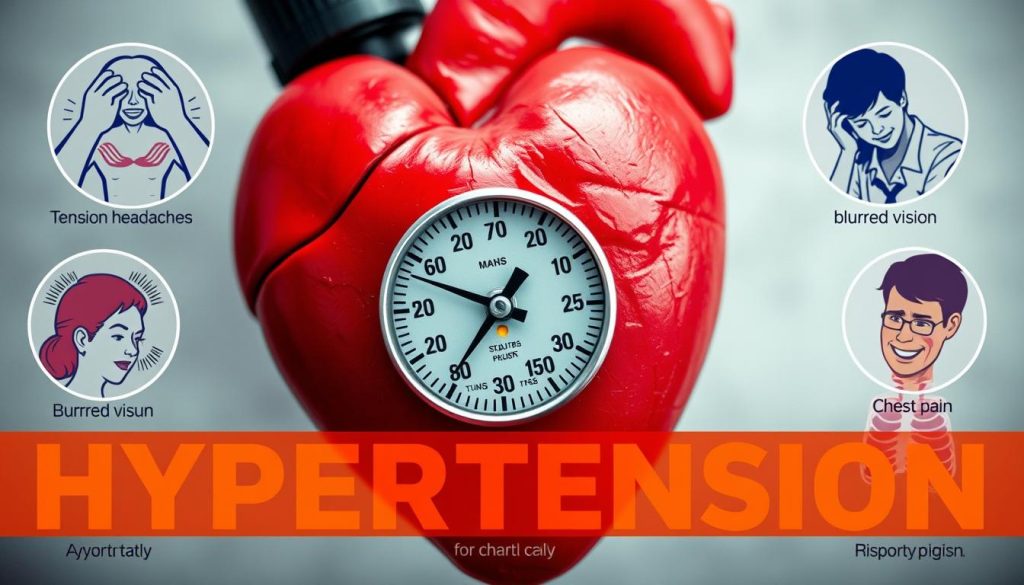
When to Seek Medical Attention
Some symptoms need immediate medical help:
- Severe headaches
- Chest pain
- Vision problems
- Irregular heartbeat
If you notice these symptoms, get help right away. Quick action is vital in managing hypertension and preventing related conditions like dementia.
Silent Symptoms and Hidden Dangers
Hypertension is often called the “silent killer” because it has no obvious symptoms. Regular blood pressure checks are key for early detection and management.
| Blood Pressure Category | Systolic (mmHg) | Diastolic (mmHg) |
|---|---|---|
| Normal | Less than 120 | Less than 80 |
| Elevated | 120-129 | Less than 80 |
| Stage 1 Hypertension | 130-139 | 80-89 |
| Stage 2 Hypertension | 140 or higher | 90 or higher |
Be careful with your blood pressure. Regular checks and knowing these symptoms can improve your health and hypertension management.
Diagnostic Methods and Blood Pressure Monitoring
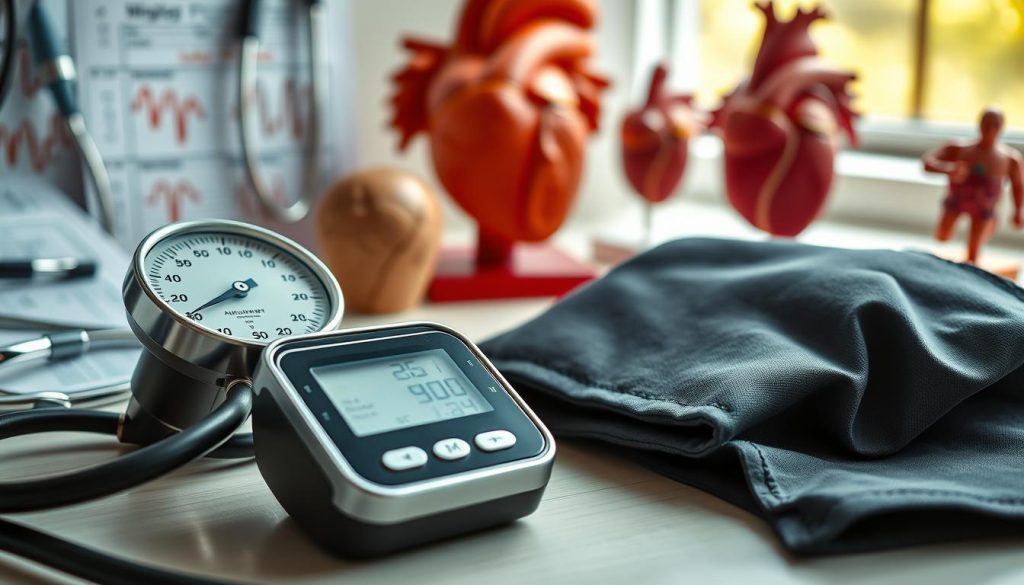
Getting an accurate diagnosis and monitoring blood pressure regularly is key. Healthcare providers use different methods to measure and track blood pressure. This ensures they can offer the best treatment options for high blood pressure.
The sphygmomanometer is the most common tool. It has an inflatable cuff that goes around your upper arm. This device measures your systolic and diastolic pressure. It gives a starting point for diagnosis and ongoing care.
Doctors might suggest other tests for more detailed checks:
- Ambulatory blood pressure monitoring (ABPM): A portable device worn for 24 hours to track pressure changes throughout daily activities.
- Home blood pressure monitoring: Patients use personal devices to record readings at different times of day.
- Central blood pressure measurement: Advanced technique to assess pressure in the aorta, closer to the heart.
Regular monitoring lets healthcare providers tweak treatment plans as needed. It’s vital for patients to stick to their doctor’s advice on how often and when to take readings.
“Consistent blood pressure monitoring is key to successful hypertension management. It empowers patients to take an active role in their health and allows for timely adjustments in treatment.”
By using these diagnostic methods, along with lifestyle changes and medication, patients can aim for and keep healthy blood pressure levels.
Comprehensive Treatment Approaches for Hypertension Management
Managing high blood pressure needs a mix of treatments. This includes medicines and lifestyle changes. These options help patients take back control of their health.
Medication Options and Their Effects
Hypertension medicines are key in managing blood pressure. There are several types:
- Diuretics
- ACE inhibitors
- Beta-blockers
- Calcium channel blockers
Each type works in its own way to lower blood pressure. For instance, diuretics help remove extra sodium and water. ACE inhibitors relax blood vessels. Recent advances in hypertension treatment have given patients more options.
Lifestyle Modifications for Blood Pressure Control
Changing your lifestyle is often the first step. This includes:
- Reducing sodium intake
- Increasing physical activity
- Maintaining a healthy weight
- Limiting alcohol consumption
Alternative and Complementary Therapies
Some people try alternative therapies with traditional treatments. These might include:
- Meditation and stress reduction techniques
- Acupuncture
- Herbal supplements
While these methods can help, it’s important to talk to a doctor before starting.
| Treatment Type | Effectiveness | Side Effects |
|---|---|---|
| Medications | High | Varies by medication |
| Lifestyle Changes | Moderate to High | Minimal |
| Alternative Therapies | Varies | Generally low |
Prevention Strategies and Lifestyle Changes
Keeping your heart healthy starts with preventing high blood pressure. Making lifestyle changes can help manage blood pressure naturally. Healthy habits can lower your risk of high blood pressure or control it if you already have it.
First, pay attention to what you eat. Include lots of fruits, veggies, whole grains, and lean proteins. Try to keep salt intake under 2,300 mg a day. The DASH diet is a great way to naturally manage blood pressure.
Exercise is also key. Aim for 150 minutes of moderate activity or 75 minutes of vigorous activity weekly. Brisk walking, swimming, or cycling can help lower your blood pressure.
Managing stress is important too. Try meditation, deep breathing, or yoga. These can help control blood pressure by reducing stress hormones.
| Lifestyle Change | Potential Blood Pressure Reduction |
|---|---|
| Reduce salt intake | 2-8 mm Hg |
| Regular physical activity | 4-9 mm Hg |
| Maintain healthy weight | 5-20 mm Hg per 10 kg weight loss |
| Limit alcohol consumption | 2-4 mm Hg |
By making these lifestyle changes, you can manage your blood pressure naturally. This will improve your heart health overall.
Long-term Complications of Untreated Hypertension
Untreated high blood pressure can cause serious health problems over time. It’s important to understand these risks to prevent heart disease and manage hypertension complications. Learn more about heart disease prevention and managing hypertension complications.
Organ Damage and System Effects
Prolonged high blood pressure can harm vital organs:
- Heart: Increased risk of heart attacks and heart failure
- Brain: Higher chance of stroke and memory problems
- Kidneys: Possible kidney disease or failure
- Eyes: Vision loss due to damaged blood vessels
Quality of Life Impact
Hypertension complications can greatly affect daily life. Chronic fatigue, reduced physical abilities, and constant health concerns may lead to:
- Decreased work productivity
- Limited social interactions
- Increased healthcare costs
- Emotional stress and anxiety
Prevention of Secondary Conditions
Proper management of high blood pressure is key to preventing secondary health issues. Effective strategies include:
- Regular blood pressure monitoring
- Following prescribed medication regimens
- Adopting a heart-healthy diet
- Engaging in regular physical activity
- Stress management techniques
By addressing hypertension early, you can significantly reduce the risk of long-term complications and improve overall health outcomes.
Latest Research and Medical Advancements in Hypertension Treatment
Recent breakthroughs in hypertension research have opened up exciting new avenues for treatment. Scientists are exploring innovative hypertension treatment options that go beyond traditional medications. These include cutting-edge therapies like renal denervation, which targets nerves in the kidneys to lower blood pressure.
Emerging technologies are also transforming how we approach hypertension management. Wearable devices now offer continuous blood pressure monitoring, allowing for more personalized treatment plans. This real-time data helps doctors adjust medications more effectively, improving patient outcomes.
For those interested in managing hypertension naturally, research is uncovering promising approaches. Studies show that mindfulness meditation and yoga can help lower blood pressure. Plant-based diets rich in potassium and magnesium are gaining attention for their ability to reduce hypertension risk. These natural methods, combined with regular exercise, offer new hope for people seeking alternative ways to control their blood pressure.
As research progresses, the future of hypertension treatment looks bright. From gene therapy to artificial intelligence-driven health monitoring, upcoming advancements promise to revolutionize how we prevent, diagnose, and treat high blood pressure. These developments bring us closer to more effective, personalized hypertension management strategies.
FAQ
Q: Is hypertension considered a cardiovascular disease?
A: Hypertension is not a cardiovascular disease itself. But it’s a big risk factor for heart and blood vessel problems. It can lead to heart disease, stroke, and other serious issues.
Q: What are the primary causes of hypertension?
A: Hypertension can come from genetics, unhealthy lifestyle, age, stress, and some medical conditions. Eating too much salt and drinking too much alcohol also play a part.
Q: How does hypertension affect the cardiovascular system?
A: High blood pressure strains the heart and blood vessels. This can cause damage, hardening of the arteries, and heart enlargement. It also raises the risk of heart attack and stroke.
Q: What are the key risk factors for developing hypertension?
A: Risk factors include family history, age, race, obesity, and not being active. High sodium intake, alcohol, stress, and conditions like diabetes also increase risk.
Q: What are the common symptoms of hypertension?
A: Hypertension often has no symptoms. But some people might get headaches, shortness of breath, nosebleeds, or vision changes. It’s important to get regular blood pressure checks.
Q: How is hypertension diagnosed?
A: Doctors diagnose hypertension with blood pressure tests. They take several readings to confirm. They might also do more tests to check for damage or find the cause.
Q: What are the main treatment options for hypertension?
A: Treatment includes lifestyle changes and medicines. Lifestyle changes include diet, exercise, and managing stress. Medicines like ACE inhibitors and beta-blockers are also used. The plan is tailored to each person’s health.
Q: Can hypertension be managed naturally without medication?
A: For mild hypertension, lifestyle changes can work. This includes a healthy diet, exercise, stress reduction, and not drinking too much alcohol. Always talk to a doctor before making big changes.
Q: What are the possible complications of untreated hypertension?
A: Untreated hypertension can cause heart attack, stroke, heart failure, and kidney damage. It can also lead to vision problems and affect your brain. Managing hypertension is key to avoiding these issues.
Q: How often should I have my blood pressure checked?
A: Adults with normal blood pressure should get checked every two years. Those with hypertension or risk factors might need more frequent checks. Home monitoring is also helpful for managing blood pressure.












